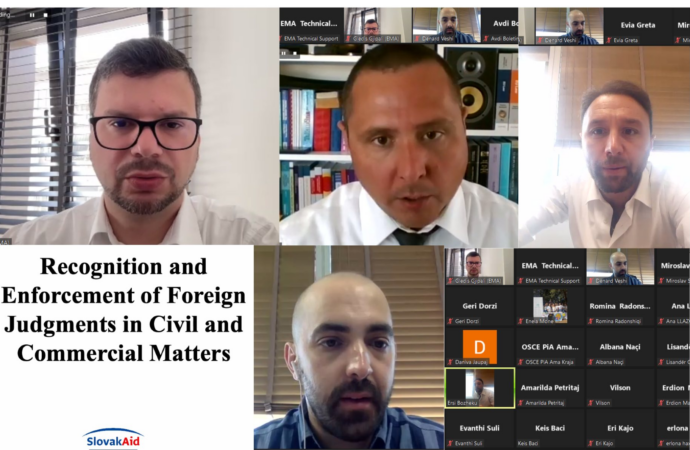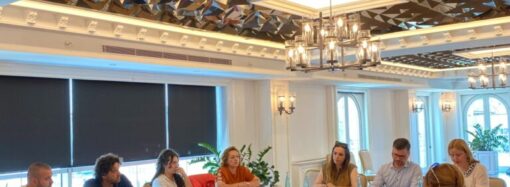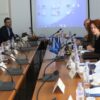On May 27, 2022, was held the first session of the Working Group II (Justice, Freedom, Security) on the topic ‘Judicial cooperation in civil and commercial matters’, which was organized by the European Movement in Albania (EMA) in cooperation with Slovak Foreign Policy Association, with financial support from SlovakAid. This is the first session of WG II under the National Convention for European Integration for the period 2021-2023. The meeting took place online on the ZOOM platform.
The session was opened by Gledis Gjipali, Executive Director of the European Movement in Albania (EMA), who said that today’s topic is of much interest, also for the fact that it has not been treated so much in the process of European integration of Albania. Gjipali highlighted that this session is important, not only in the context of Albania’s European integration process, but also in frame of the development of the judicial system and finding the best possible solutions for Albanian citizens.
Denard Veshi, Lecturer at Beder University made a brief presentation based on the international legislation and the recognition of court decisions in the civil and criminal field. He stated that in international law, as well as in European Union law and also in Albanian law, cooperation in the civil and commercial field is of relevance. Veshi started the presentation by introducing the participants with international law, where he was focused on two important treaties, the 1971 Treaty and the 2019 Treaty. He said that unfortunately these treaties have been ratified by very few states, while the treaty of the year 1971 has been ratified by Albania too. Following the presentation, he talked about one of the innovations that the EU is doing in recent years, such as participating in international organizations, for example: the EU (not only its Members States) is a partner in the Agra Conference – in private international law. Veshi said that Albania has approximated a significant part of his legislation with the European Union one, although we are not yet part of it. It was further stated that the codes are very important in the Albanian legislation and have more power than the law, because they are approved by three-fifths of the parliament members. So, it is very important to understand which are the bodies that make possible the recognition of decisions in the civil and the commercial fields in different countries.
In following, Ersi Bozheku, Lawyer at the High Court of Appeal in Rome, Italy and Professor at the University of Rome, La Sapienza, made a presentation of the legal framework in Albania, institutions, criminal offences in financial matters, as this field is becoming more and more important and requires to be treated in a professional manner as much as possible. According to Bozheku, the concept in which we live seems very solid and harmonious, but if we look deeper, the European context is complicated, not only because we have different populations, but also because we have different legislations, and the legal form is totally different from state to state. This makes Europe to be called the European Union, but we do not have a European country because the legislation in these countries may be the same, but the way of interpreting the laws varies from country to country. This issue is seen in the concrete development of legislation in the European context, which has offered open spaces for criminal organizations to exploit them to carry out their activities. Bozheku further stated that European legislation should be adapted based on the context and reality, taking the example of Albanian legislation, which in terms of lexicon responds to European directives, but is not able to be implemented and this type of issue can be encountered in the field of criminal and financial law . Bozheku added that the solution to the problems would be to increase the level of the knowledge of the law, adding that investment should be made in the implementation and establishment of strong institutions in law enforcement, where the system should be strengthened, but also the capacity level should be increased, as well as the level of Universities because there are formed and emerge the generations of future lawyers. Bozheku stated that if Albania wants to make a tangible development, then the priority would be to pay attention to the substance, the content of things, so investment should be made in the training of lawyers and the capacity building of the administration.
It was Miroslav Slašťan, Professor in the Department of Justice and International Relations at Comenius University in Bratislava who continued his speechfocused mainly on civil and commercial matters, bringing the Slovak experience in court cases. Slašťan during his speech focused on the private international law of the European Union and on the rights and obligations of individuals. According to Slašťan, the condition for the application of this law is the international element and that the cooperation of the courts is also very important. Mr. Slašťan further did not hesitate to give recommendations on how to have effective cooperation, how to increase capacities and how to strengthen cooperation among these structures.


















